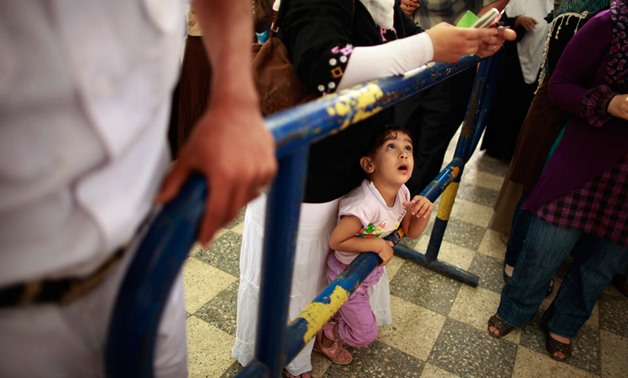
(Reuters) A girl looks up as her mother waits to cast her vote outside a polling station
CAIRO – 12 May 2018: Under the patronage of Bawaba news portal, a seminar was held on Thursday to discuss the impact of the proposed child visitation law on children, parents and society.
As the proposed amendments to the child custody-related laws are still an issue, the controversy refuses to fade.
The new amendments to the personal status law confirms the non-custodial parent’s right to receive the child for 38 hours weekly, for a week during the mid-year vacation and for a month during the summer vacation.
The custodian parent, who is ideally the mother, shall be jailed for six months if she declines to enforce the above-mentioned amendments. The law was initially proposed by MP Mohamed Fouad, spokesperson for the Wafd Party.
Journalist and writer Farida el-Shobashy said that lawmakers should study the aspects of the law before passing it and determine its potential impacts on children’s well-being.
“Egypt has more than 12 million street children and that number is on the rise. This is the result of failed marriages and the lack of awareness of the parents on how to maintain a healthy relationship between them after their separation,” she added.
Also, lawyer Maha Abu Bakr said that a father who does not fend for his child does not have the right to receive the minor, asserting that the mother’s right to look out for her child is a mission assigned to her by God.
She also requested setting the minimum age for the child to be under the guardianship of his mother to 18 years old instead of 15.
Activist Janeet Abdel Aleem also stressed that the right of the mother to raise her child, so that we can ensure our children grow up to be mentally and psychologically sane, condemning that partners would seek revenge from each other and to the detriment of the child.
According to the Egyptian personal status law, an Egyptian divorcee has the right of custody of her child until he/she reaches the age of 15, and then the child must make his/her own decision as to which parent to live with.
In addition to ensuring that the mother is physically, mentally and psychologically able to look out for the minor and has not been convicted of criminal offences, she must not remarry. In such a case, the child’s custody falls to blood relatives, with grandparents coming at top, while fathers are at the end of the spectrum.
In late 2016, a new amendment was introduced by a group of parliamentarians to give custody of the child directly to the father if the mother remarries, and the father is then entitled to provide a female caretaker to the minor, namely a new wife.
The law sparked an outcry by activists and female divorcees that see the law as “unfair” and against the rights of both women and children.
According to a 2013 study by the Association for the Development and Enhancement of Women, 90 percent of divorced women choose not to remarry, lest they lose custody of their children.
Since the beginning of 2018, 52 percent of the divorce cases lodged by wives to the Family Court are due to dispute escalations over husbands’ complaints about wives not paying sufficient attention to their looks after marriage.

Comments
Leave a Comment